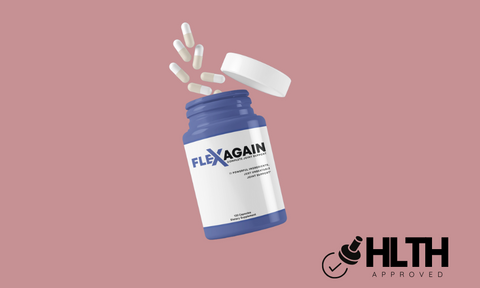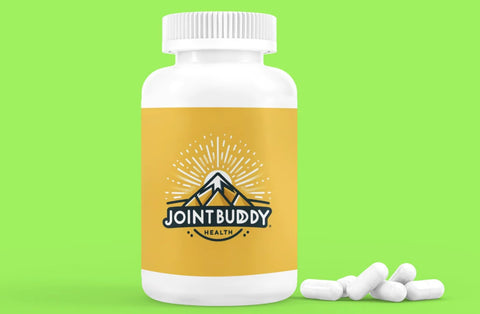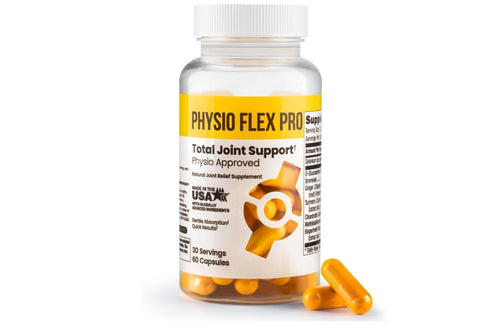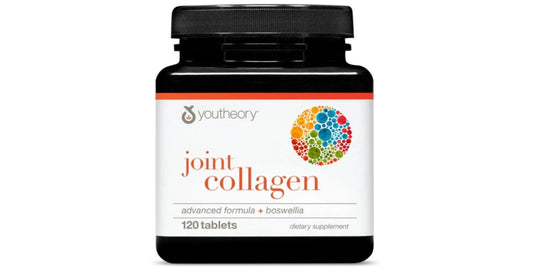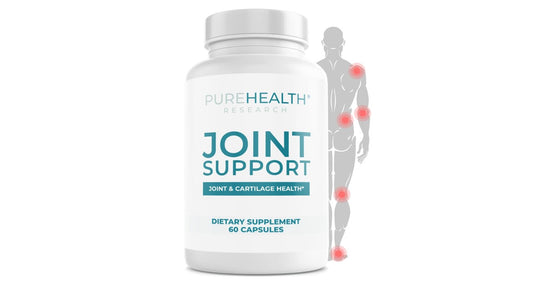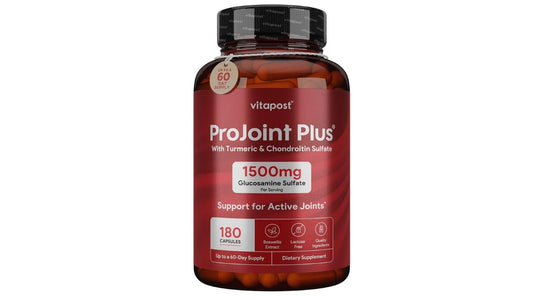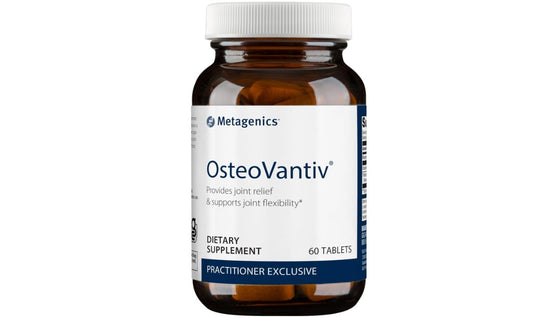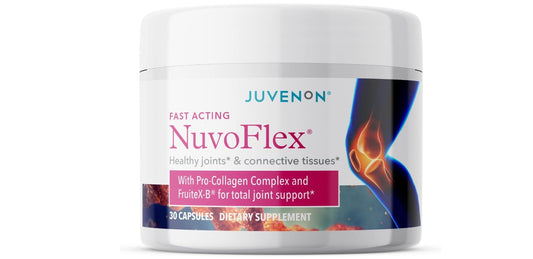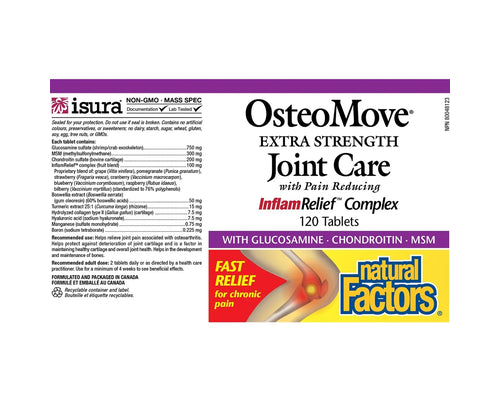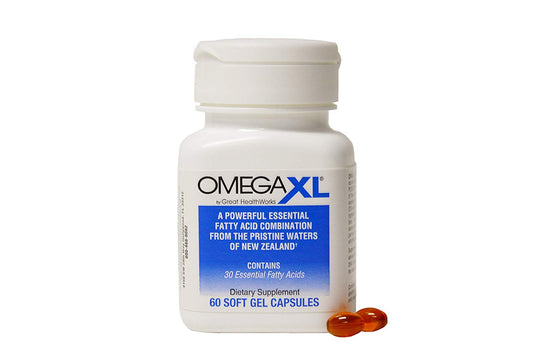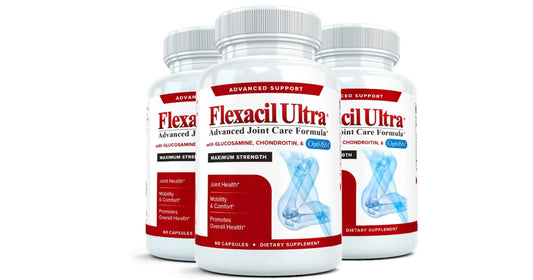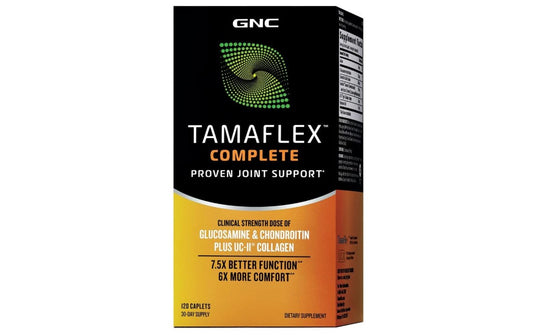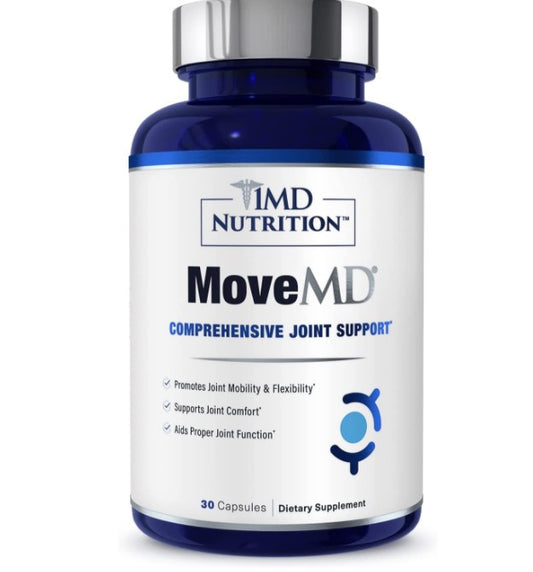Joint Supplements
Joint supplements are fast becoming one of the top selling dietary supplements on the market. In fact, the National Center For Complementary And Integrative Health claim that the health benefits they can offer are as, if not more, effective than some prescription medications. Omega-3 fatty acids have gained popularity for their anti-inflammatory properties and potential benefits in alleviating joint pain. These essential fatty acids, primarily found in fish oil supplements, have been studied extensively for their impact on arthritis symptoms. Research suggests that omega-3 supplements can reduce stiffness and inflammation in people with arthritis, particularly rheumatoid arthritis. [1] With some studies going as far as to show it can be more effective in treating said pain than NSAIDs. Turmeric, a vibrant yellow spice commonly used in Indian cuisine, has gained popularity as a natural supplement for pain management, particularly for joint pain caused by osteoarthritis. The active compound in turmeric, curcumin, is believed to possess anti-inflammatory properties. Although research on turmeric's effect on joint pain is limited, a comprehensive analysis of studies found that it improved symptoms more than a placebo and showed comparable efficacy to ibuprofen. To incorporate turmeric into your routine, consider taking a daily dose of 500 mg of curcumin, and remember curcumin is less than 10% of turmeric so be sure to get a supplement that says curcumin specifically. Aside from Omega, curcumin is one of the most well studied joint pain supplements and arguably the best option for an individual supplement if you already get a lot of fish oil from your diet. Glucosamine is a natural compound found in the body, particularly in cartilage. It plays a vital role in maintaining joint function and mobility. Many individuals turn to glucosamine supplements to help manage pain and reduce symptoms associated with osteoarthritis and rheumatoid arthritis. As a naturally occurring substance, glucosamine is generally considered safe to take. However, it's important to note that some glucosamine supplements are derived from shellfish, so individuals with shellfish allergies should avoid them. Mild side effects like nausea and heartburn may occur in some cases. If you are taking blood thinners, consult with your doctor before starting glucosamine supplementation to avoid potential bleeding risks. Although research results on the effectiveness of glucosamine vary, many individuals have reported improved joint comfort and reduced pain with regular use. Vitamin D is well-known for its importance in maintaining bone health. However, recent studies have suggested that vitamin D supplementation may also have a positive impact on joint health and arthritis symptoms. Vitamin D helps the body absorb calcium, a mineral vital for strong bones and cartilage structure. Research has shown that individuals with low vitamin D levels are more likely to experience joint pain and inflammation. While more research is needed to establish a definitive link between vitamin D supplementation and arthritis relief, taking a vitamin D supplement, especially if you have a deficiency, may be beneficial. It's essential to be cautious when adding a vitamin D supplement to your routine, as high levels of this vitamin can interact with certain medications. Chondroitin is a substance naturally found in cartilage and is often combined with glucosamine in joint health supplements. While research results on chondroitin's effectiveness have been inconclusive, many individuals report positive effects on joint pain and function. Chondroitin supplements are generally safe to take, but caution should be exercised if you are taking blood thinners like Warfarin, as chondroitin may increase the risk of bleeding. Ginger, a versatile spice known for its distinctive flavor, also possesses potential anti-inflammatory properties. Several studies have suggested that ginger may help reduce joint pain and improve overall mobility in individuals with osteoarthritis. The active compounds in ginger, such as gingerols and shogaols, are believed to contribute to its analgesic and anti-inflammatory effects. Incorporating ginger into your diet or trying ginger supplements can be a natural and flavorful approach to managing joint pain. it is important to note however, that most stufies have shown you need between 1.2-3 grams, which is more than in the majority of supplements, there is a particular extract which works as well without around 250mg, but the only product we know of that contains this is FlexAgain. Vitamin E is known for its antioxidant properties and its role in supporting the immune system. Some research suggests that vitamin E supplementation may slow the progression of osteoarthritis and promote the growth of new cartilage cells. However, further studies are needed to confirm these findings. Vitamin E is generally safe to take, but it can interact with certain medications, particularly blood thinners, and increase the risk of bleeding. Before adding a vitamin E supplement to your routine, consult with your doctor to ensure it is safe and suitable for you. Boswellia, also known as Indian frankincense, is derived from the Boswellia serrata tree and has a long history of use in Ayurvedic medicine for its anti-inflammatory properties. Studies have shown that Boswellia extract may help reduce joint pain and improve mobility in individuals with osteoarthritis. The active compounds in Boswellia, known as boswellic acids, are believed to inhibit the production of inflammatory molecules in the body. Methylsulfonylmethane (MSM) is an organic sulfur compound that has gained attention for its potential joint health benefits. It is believed to reduce inflammation and oxidative stress, which can contribute to joint pain. While scientific research on MSM's efficacy is limited, some studies have shown promising results in terms of pain reduction and improved physical function in individuals with osteoarthritis. A Joint supplement is a natural dietary supplement that can be bought over the counter or online without a prescription. They can contain everything from common ingredients like vitamin d to more obscure items that most people will likely never have heard of. So, joint supplements are a great way to help reduce inflammation and combat common issues like knee pain. However, countless esteemed medical institutions also suggest that they are a great way to produce a variety of other benefits on the human body. Arthritis in all its forms is a degenerative disease that causes the erosion of cartilage and leads to painful joints. A natural supplement using things like fish oil, glucosamine, and chondroitin can help to reduce inflammation, promote the growth of new cartilage, and lubricate joints. Depending on the ingredients they contain, joint supplements can do anything from reducing inflammation to lubricating your joints. These effects will prevent the bones in a joint from rubbing together, leading to a significant reduction in joint pain. When you reduce inflammation and lubricate a joint, you not only prevent joint pain but you also create better conditions for healing too. Joint supplements may all look very similar, but they can vary wildly from one product to the next, and it is vital that you select the right one if it is going to be successful. Joint supplements are suitable for use by virtually everyone. From an athlete dealing with minor knee pain to an arthritis sufferer hoping to reduce inflammation and improve their condition, supplements for joint pain can enhance joint health in virtually everyone. While there are a variety of great supplements for joint pain out there, none are as effective as FlexAgain. Packed with optimal doses of things like vitamin d, glucosamine, and chondroitin, it can reduce inflammation and joint pain while promoting lubrication and cartilage growth. Are joint supplements safe? Dr Mark Watson is the founder of Center TRT, having graduated from stamford more than 20 years ago, he is an expert in the field of supplemental health, focusing on long term benefits of complimentary treatment.
As the population get's older joint pain is becoming a more and more common issue that affects a bigger portion of the population every year. The most prevalent form of arthritis, osteoarthritis, is often responsible for this chronic discomfort. While pain relievers like acetaminophen and nonsteroidal anti-inflammatory drugs (NSAIDs) are frequently used for joint pain relief, many individuals seek alternative options to manage their symptoms. One such avenue is the use of natural supplements, which claim to alleviate joint pain. They can relieve joint and muscle pain, reduce inflammation, improve the health and growth of the connective tissues, and even support joint health as a whole. The only problem is, with joint supplements often using unusual ingredients, many people won't know which one to use.
If you truly want to improve your joint, cartilage, and bone health with a natural supplement, it is vital you pick the right one. So, before you waste your money on the wrong product, let's take a look at the best supplements for joint pain around, to ensure you make the right choice.
If you want to skip ahead to the best joint supplement overall, we recommend FlexAgain.Best Joint Supplements: The Science Of Individual Supplements
Omega 3 For Joint Pain
Omega-3s are generally safe to take, but they may cause mild side effects such as heartburn, nausea, or diarrhea. If you are taking blood thinners, it's crucial to consult with your doctor before starting omega-3 supplementation, as there is a slight risk of bleeding when combined with these medications. Adding omega-3 supplements to your daily routine may not only improve joint health but also provide additional benefits such as protecting against heart disease and dementia.Turmeric: A Golden Spice for Joint Pain Relief
Glucosamine: Supporting Joint Function and Reducing Pain
Vitamin D: Essential for Bone and Joint Health
Chondroitin: Promoting Joint Health and Reducing Pain
Ginger: A Zesty Spice with Anti-Inflammatory Potential
Vitamin E: Antioxidant Support for Joint Health
Boswellia: Tapping into Ancient Wisdom for Joint Pain Relief
MSM: A Sulfur Compound for Joint Support
What Are Joint Supplements?
They are designed to help improve joint health and lubrication, reduce inflammation and joint pain, even in people dealing with chronic conditions like arthritis, and promote the growth of new tissues.Benefits Of Joint Supplements
Treating Osteoarthritis Or Rheumatoid Arthritis Symptoms
This means joint supplements can be used not only for reducing pain caused by the condition, but also for either repairing the damage it has caused or preventing it from getting any worse.Reducing Joint Pain
Improving Joint Health
Throw in ingredients like a turmeric supplement that can also aid the growth of new cartilage, and you can use a joint supplement to restore joint health back to its original condition as well.How To Choose Joint Supplements
The ingredients are the most important thing to consider, as this will determine both the good and the bad effects a supplement can have. Stick to supplements that use proven ingredients like glucosamine and chondroitin you should enjoy great benefits with very little risk.
You also want to look at the number of ingredients used and their dosages. While lots of ingredients can be good as they may produce more effects, make sure to check that they are used in their optimal doses, to ensure the product will actually work.
Finally, analyse some of the more superficial aspects of the product, like the price or if it comes in capsule or powder form. Ensuring that you can afford a supplement and will be happy to take it long term is essential if it is going to be successful.Who Should Take Joint Supplements?
Final Thoughts On The Best Supplements For Joint Pain
If for some reason you don't feel it is the right choice for you, one of the other picks on our list of the best supplements for joint pain certainly will be. However, for everyone else, we highly recommend that you give FlexAgain a try and see the joint health benefits it offers for yourself.Joint Supplements FAQ
As with many supplements and medications, you shouldn't mix joint supplements with other blood thinners to avoid unwanted interactions. If they're safe for you depends on your preconditions such as allergies and of course the ingredients contained.
Do joint supplements work?
As with every supplement, the results from supplementation depend on many factors such as additional lifestyle changes, diet, sports etc. If you're unlucky, you won't notice any effect from it, in rare cases they might literally change your life for the better in a short period of time. It really depends on the exact joint condition you suffer from and other angles than besides supplementation from which you attack the issue.
Do they work for animals like dogs and horses as well?
Yes, joint supplements can work for animals like dogs and horses thanks to key ingredients such as glucosamine, chondroitin, and MSM that work to improve joint health and reduce inflammation. They can be particularly useful for larger animals such as horses that place a significant amount of strain on their joints due to their size and weight. Same as for people, it's important to note that the effectiveness of joint supplements will vary depending on the animal's individual health and medical history.
What are the most prominent ingredients?
Glucosamine and chondroitin are used as most joint supplements and have undergone extensive research. Though results are conflicting, certain studies indicate that these supplements can help decrease joint stiffness and pain, enhance joint function, and even slow down the progression of joint damage in people with osteoarthritis. These supplements may benefit individuals who are seeking alternative remedies for joint pain and discomfort. However, it's important to note that they're no cure for arthritis or other joint conditions. Along side that omega 3, vitamins and curcumin are the next most studied and well backed supplements for joints, with gingerols coming up just behind that.Fact Checked By Dr Mark Watson MD
References
